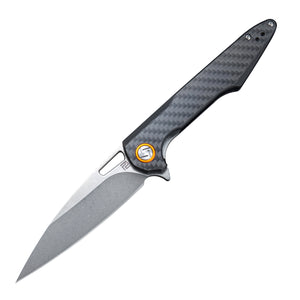Choosing the Right Flipper Knife: A Buyer's Guide for Novice Users is essential for those who are new to the world of knives and want to make an informed decision. A flipper knife is a type of folding knife that features a blade that can be deployed with a simple flick of the thumb. It is designed for quick and easy one-handed opening, making it a popular choice among outdoor enthusiasts, survivalists, and everyday carry enthusiasts.

Understanding Flipper Knives
When it comes to Choosing the Right Flipper Knife: A Buyer's Guide for Novice Users, it is important to understand the key features and components of a flipper knife. The blade of a flipper knife is typically made from high-quality stainless steel, known for its durability and corrosion resistance. The handle is usually made from materials such as G-10, titanium, or carbon fiber, providing a comfortable grip and lightweight design.
One of the distinguishing features of a flipper knife is the flipper tab, which is a small protrusion on the back of the blade. This tab allows the user to easily open the knife with a quick flick of the thumb. The flipper tab acts as a lever, deploying the blade smoothly and swiftly. It is important to note that flipper knives are not automatic knives and do not require a button or switch to open.
Factors to Consider
When Choosing the Right Flipper Knife: A Buyer's Guide for Novice Users, there are several factors to consider:
Blade Design
The blade design plays a crucial role in the functionality and versatility of a flipper knife. There are various blade shapes to choose from, including drop point, tanto, and spear point. Each blade shape has its own advantages and is suited for different tasks. For example, a drop point blade is ideal for general-purpose use, while a tanto blade offers enhanced piercing capabilities.
Blade Material
The choice of blade material is another important consideration. High-quality stainless steel, such as CPM-S30V or VG-10, is commonly used in flipper knives due to its excellent edge retention and corrosion resistance. Other factors to consider include the hardness of the steel, which affects its ability to hold an edge, and the ease of sharpening.
Handle Material
The handle material not only affects the aesthetics of the flipper knife but also its durability and grip. G-10, a fiberglass-based laminate, is a popular choice for its strength and resistance to moisture. Titanium handles offer a lightweight and corrosion-resistant option, while carbon fiber handles provide a combination of strength and lightweight design.
Locking Mechanism
Choosing the Right Flipper Knife: A Buyer's Guide for Novice Users should also consider the locking mechanism of the knife. Common types of locking mechanisms include liner locks, frame locks, and axis locks. These mechanisms ensure that the blade remains securely in place during use, providing safety and peace of mind.
Conclusion
Choosing the Right Flipper Knife: A Buyer's Guide for Novice Users is an important step in finding the perfect flipper knife for your needs. By considering factors such as blade design, blade material, handle material, and locking mechanism, you can make an informed decision that suits your preferences and requirements.
For more information on Choosing the Right Flipper Knife: A Buyer's Guide for Novice Users, you can visit the following credible sites:


